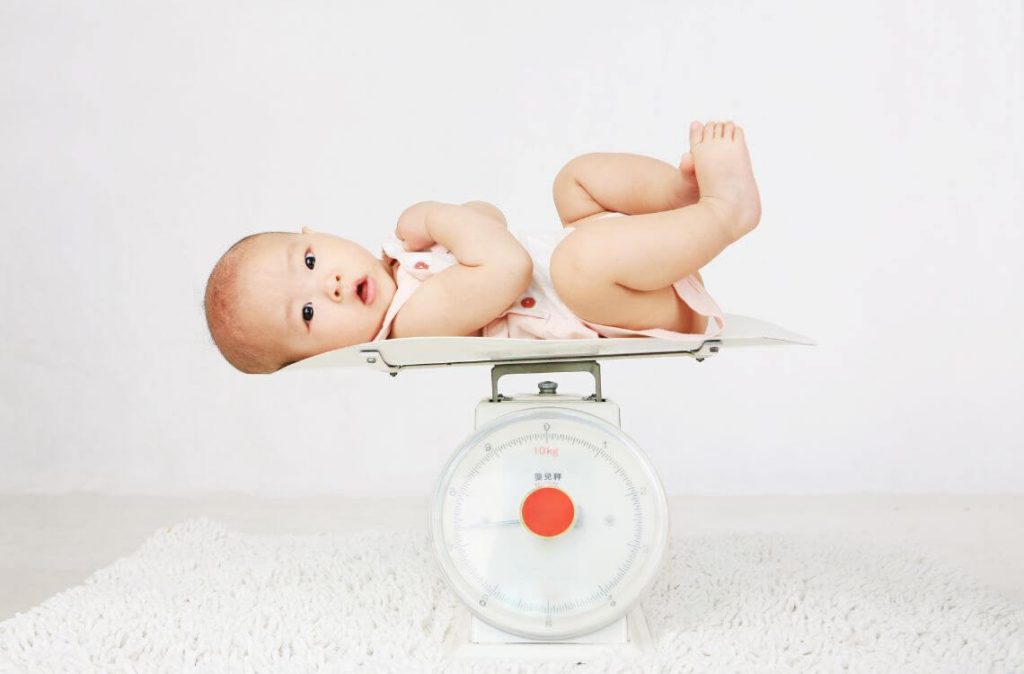Baby weight is a major concern, especially in the early months.
How do we tell whether our baby’s weight is at an optimum or not?
What is the Average Baby Weight
The average newborn weight in Malaysia is 3.5 kg. The normal weight range is 2.5 to 4.5 kg.
If your baby is heavier than the normal weight range, they might just be a big baby. This is affected by multiple factors but is not a reason to worry.
For the most part, a chubby baby is a happy baby.
However, if your baby weighs less than 2.5 kg, this may be cause for concern. Premature babies are often underweight but if your baby is born at full term, there is likely an underlying cause to their low birth weight.
An underweight baby is more vulnerable to sickness and infection. It indicates low nutrition and weakness.
All this being said, there are many ways to ensure that they get back to normal weight.
Additionally, newborns tend to fluctuate in weight within the first few weeks of their lives; so, this issue may resolve naturally.
This is just one of the many newborn milestones.
Let’s Talk About Your Baby’s Weight
As mentioned before, a newborn baby’s weight changes frequently. The first weight loss will occur within the first one or two days.
It occurs due to fluid loss after birth and it is completely normal to lose 5-10% of body mass.
This is the only notable transformation.
By the two-week mark, your baby will be back to their birth weight; especially if they’ve been breastfed. They could even weigh a bit more.
After this initial weight gain, your baby should gain anywhere between 140 to 200 grams per week for the next few months.
This will result in double the birth weight at around five months and lead to around triple the weight once they turn one year old.
Your baby’s weight gain will not likely be at a constant increase; with periods of low weight gain as well as growth spurts.
It is best not to be too rigid with how you track their weight as you may end up stressing yourself.
How to Tell if Your Baby is at a Healthy Weight
If you want to measure your baby’s weight, it is best to take them to the clinic or paediatrician for the first year or so.
They will measure your baby’s weight during well-baby visits, but you can take them in between if you wish.
It is possible to measure them at home but home scales are not accurate enough to detect the small changes that matter in baby growth.
You can use a home scale for rough measurement but do not take these too seriously.
Another indicator for healthy babies is their bowel movement.
If they produce eight to 10 wet nappies a day of which five are faecal matter, you are good to go. This shows your baby is getting enough food.
What Affects Your Baby’s Weight
Breastfeeding
Breastfed babies are usually at optimum weight as they naturally get high quality nutrients from their mother’s milk.
If they seem a little overweight, they might have just gotten a larger appetite.
If your baby is breastfeeding but not gaining weight, this may because they are not draining the breast. The hindmilk is the fattiest part of the milk and affects your baby’s weight the most.
Feeding your baby from one breast for 10 to 15 minutes before switching should ensure they drain the milk.
Food
Whether your baby is formula or breastfed, it’s important that they are fed every three to four hours.
As they get older, this amount will reduce but always refer to your paediatrician before making any changes.
If you are having trouble breastfeeding, it is advisable to invest in a breast pump so you can supplement your baby’s diet with a bottle.
Breast milk is nutritious no matter the form and breastfeeding can be a tiring ordeal, so do what is best for you.
Genetics
If your baby is genetically predisposed to large or small stature, that may the reason for their abnormal weight.
For example, babies with Polynesian ancestry are usually much bigger than the average baby.
In Malaysia babies are generally classified as normal or small according to worldwide standards.
Health
Preterm babies (aka preemies) are one of the most common among cases of underweight babies.
Underdevelopment in the womb causes them to have nutritional deficiencies as well.
Congenital defects may also lead your baby to be underweight.
This is more concerning, but can be corrected at birth by paediatric surgeons if the issue is not too serious.
Health issues that occur after birth are another factor in weight loss.
Illnesses like common cold can cause weight loss, but babies can gain their weight back after recovery without complications.
The health of the mother during pregnancy also affects the baby. If you do not take care of yourself by eating well and getting enough rest, it may lead to an underweight baby.
Teen mums also tend to give birth to smaller babies.
Happy Baby, Healthy Baby
At the end of the day, we all want our babies to be happy and healthy. Taking care of their health by feeding them well is one of the best things to do to ensure that. You’ve got this, parents!
For more insightful stories and fun recipes, stay tuned to Motherhood Story!
